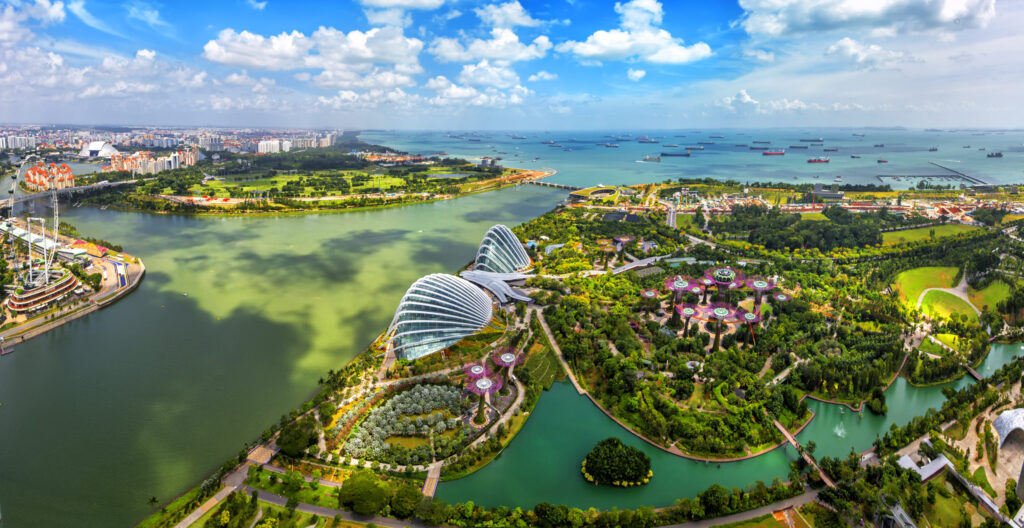Trade and Investment Dynamics in Bangladesh & Singapore
Md. Joynal Abdin*
Business Consultant & Digital Marketer
Founder & CEO of Trade & Investment Bangladesh
Introduction:
The trade and investment dynamics between Bangladesh and Singapore represent a compelling narrative of mutual collaboration and economic synergy. Situated in South Asia and Southeast Asia respectively, these two nations have forged a robust partnership characterized by burgeoning trade volumes, strategic investments, and a shared vision for economic prosperity. This introduction aims to provide an overview of the evolving landscape of trade and investment opportunities between Bangladesh and Singapore, highlighting key sectors, bilateral agreements, and emerging trends shaping their economic relationship.
At the heart of Bangladesh-Singapore economic ties lies a shared commitment to fostering bilateral trade relations. Bangladesh, with its large population and growing economy, presents a lucrative market for Singaporean businesses seeking expansion opportunities. Conversely, Singapore, renowned for its strategic location, advanced infrastructure, and dynamic business environment, serves as an ideal gateway for Bangladeshi enterprises to access global markets. This complementary nature of their economies forms the foundation for a symbiotic trade relationship.
The trade landscape between Bangladesh and Singapore encompasses a diverse array of sectors, ranging from textiles and garments to electronics, pharmaceuticals, and information technology. Bangladesh’s robust textile industry, in particular, has emerged as a focal point of bilateral trade, with Singapore serving as a significant importer of Bangladeshi garments. Additionally, Singaporean companies have made notable investments in Bangladesh’s infrastructure, energy, and manufacturing sectors, contributing to the country’s socio-economic development.
Moreover, both countries have undertaken initiatives to enhance trade facilitation mechanisms, streamline customs procedures, and promote cross-border investments. Bilateral agreements such as the Bangladesh-Singapore Comprehensive Economic Partnership Agreement (CEPA) and the Avoidance of Double Taxation Agreement (DTA) have further bolstered economic cooperation, providing a framework for deeper integration and collaboration.
In recent years, the digital economy has emerged as a new frontier for collaboration, with both countries recognizing the importance of digital transformation in driving economic growth. Initiatives such as the Bangladesh-Singapore Joint Economic Council and the establishment of digital infrastructure projects underscore the commitment to harnessing technology for mutual benefit.
As Bangladesh and Singapore continue to strengthen their economic ties, opportunities abound for businesses, investors, and policymakers to capitalize on the synergies between their economies. By leveraging their respective strengths and fostering innovation-driven partnerships, they can chart a path towards sustainable growth and prosperity for both nations.
Top 10 Bangladeshi products could be exported to Singapore:
- Textiles and Garments: Bangladesh is renowned globally for its textile and garment industry, ranking among the top exporters in the world. With Singapore’s high demand for quality clothing and textiles, Bangladeshi products such as ready-made garments, knitwear, and fabrics hold significant export potential. Singaporean consumers appreciate the affordability and quality of Bangladeshi apparel, making it a lucrative market for Bangladesh’s textile manufacturers.
- Jute and Jute Products: As the world’s second-largest producer of jute, Bangladesh has a competitive edge in exporting jute products to Singapore. Jute bags, carpets, rugs, and other eco-friendly products are in demand in Singapore due to their sustainability and versatility. With increasing awareness of environmental issues, there is a growing market for Bangladeshi jute products in Singapore, especially in sectors such as packaging and home decor.
- Frozen Seafood: Bangladesh boasts rich aquatic resources and a thriving seafood industry. Products such as frozen fish, shrimp, and prawns hold immense export potential to Singapore, where seafood is a staple in the local cuisine. Bangladeshi seafood is valued for its freshness, quality, and competitive pricing, making it an attractive option for Singaporean importers and consumers.
- Leather and Leather Goods: Bangladesh is emerging as a significant player in the global leather and leather goods market. Leather products such as shoes, bags, wallets, and belts are in demand in Singapore, where consumers seek fashionable yet affordable accessories. Bangladeshi leather goods are gaining recognition for their craftsmanship and design, presenting opportunities for exporters to tap into Singapore’s fashion-conscious market.
- Pharmaceuticals: Bangladesh’s pharmaceutical industry has experienced rapid growth in recent years, producing a wide range of generic drugs, vaccines, and medical supplies. With Singapore’s emphasis on healthcare and pharmaceutical imports, Bangladeshi pharmaceutical products have the potential to capture a share of the Singaporean market. Competitive pricing, quality assurance, and adherence to international standards are key factors driving the export of Bangladeshi pharmaceuticals to Singapore.
- Ceramic Products: Bangladesh is emerging as a significant exporter of ceramic tiles, sanitaryware, and tableware products. With Singapore’s thriving construction and hospitality sectors, there is a growing demand for high-quality ceramic products. Bangladeshi manufacturers offer a diverse range of designs and finishes at competitive prices, making them attractive to Singaporean importers and contractors.
- Agro-products: Bangladesh is rich in agricultural resources, offering a variety of agro-products with export potential to Singapore. Products such as rice, fruits, vegetables, spices, and tea are in demand in Singapore’s diverse culinary scene. Bangladeshi agro-products are valued for their freshness, taste, and nutritional value, making them sought-after commodities in Singapore’s food and beverage industry.
- Electronics and Electrical Goods: Bangladesh has emerged as a manufacturing hub for electronics and electrical goods, including consumer electronics, home appliances, and electrical components. With Singapore’s advanced technology infrastructure and consumer electronics market, Bangladeshi products have opportunities for export. Competitive pricing, quality assurance, and compliance with international standards are essential for capturing market share in Singapore.
- Handicrafts: Bangladesh has a rich tradition of handicrafts, including pottery, terracotta, brassware, and traditional textiles. These artisanal products showcase Bangladesh’s cultural heritage and craftsmanship, appealing to discerning consumers in Singapore. Handicrafts are popular as decorative items, gifts, and souvenirs, presenting export opportunities for Bangladeshi artisans and entrepreneurs.
- IT and Software Services: Bangladesh’s IT and software industry is experiencing rapid growth, driven by a young, skilled workforce and government initiatives to promote digital innovation. With Singapore’s emphasis on technology and digital transformation, Bangladeshi IT firms offer services such as software development, IT consulting, and outsourcing. Collaboration opportunities abound in areas such as fintech, e-commerce, and cybersecurity, providing avenues for Bangladesh to export its expertise to Singapore.
Bangladesh offers a diverse range of high-quality products with export potential to Singapore across various industries. By leveraging their competitive advantages in terms of affordability, quality, and innovation, Bangladeshi exporters can capitalize on the opportunities presented by Singapore’s dynamic market and establish strong partnerships for mutual growth and prosperity.

Top 10 Singaporean products could be exported to Bangladesh:
- Electronics and Electrical Goods: Singapore is known for its advanced electronics and electrical goods manufacturing industry. Products such as consumer electronics, semiconductors, and electronic components have a strong potential for export to Bangladesh. With Bangladesh’s growing demand for electronic devices and appliances, Singaporean manufacturers can capitalize on this market by offering high-quality products with advanced technology and reliability.
- Medical Equipment and Pharmaceuticals: Singapore has a well-established healthcare industry, producing a wide range of medical equipment, devices, and pharmaceuticals. These products, including medical instruments, diagnostic tools, and medications, hold significant export potential to Bangladesh. With Bangladesh’s expanding healthcare sector and increasing demand for medical supplies, Singaporean companies can provide innovative solutions and high-quality products to meet the country’s healthcare needs.
- Processed Food and Beverages: Singapore is renowned for its diverse and high-quality processed food and beverage products. Items such as packaged snacks, beverages, sauces, and condiments are popular among consumers in Bangladesh. Singaporean food manufacturers can tap into Bangladesh’s growing food and beverage market by offering innovative and premium products that cater to local tastes and preferences.
- Cosmetics and Personal Care Products: Singapore produces a wide range of cosmetics, skincare, and personal care products known for their quality and effectiveness. With the rising demand for beauty and personal care products in Bangladesh, Singaporean brands can export items such as skincare creams, cosmetics, hair care products, and toiletries. These products appeal to Bangladeshi consumers seeking high-quality and international brands.
- Fashion and Apparel: Singapore boasts a vibrant fashion and apparel industry, producing trendy and high-quality clothing, accessories, and footwear. Singaporean fashion brands can explore export opportunities in Bangladesh’s growing retail market by offering fashionable and affordable apparel and accessories. With Bangladesh’s increasing demand for trendy and stylish clothing, Singaporean fashion labels can establish a strong presence in the country’s fashion scene.
- Automobile Parts and Components: Singapore manufactures a wide range of automobile parts, components, and accessories for the automotive industry. These products, including engine parts, brakes, tires, and electrical components, have potential for export to Bangladesh’s burgeoning automotive sector. With Bangladesh’s increasing vehicle production and demand for automobile spare parts, Singaporean manufacturers can supply high-quality products to meet the country’s automotive needs.
- Construction Materials and Equipment: Singapore produces a variety of construction materials, including cement, steel, glass, and ceramics, as well as construction equipment and machinery. These products are essential for Bangladesh’s growing construction industry, which is experiencing rapid urbanization and infrastructure development. Singaporean manufacturers can export construction materials and equipment to Bangladesh to support its infrastructure projects and construction activities.
- Information Technology (IT) Services and Software Solutions: Singapore is a hub for IT services and software development, offering a wide range of solutions including software development, IT consulting, and cybersecurity services. With Bangladesh’s increasing focus on digital transformation and IT infrastructure development, Singaporean IT firms can provide innovative solutions and expertise to support Bangladesh’s IT initiatives and address its evolving technological needs.
- Educational Services and Training Programs: Singapore is known for its high-quality education system and professional training programs. Singaporean educational institutions and training providers can export their expertise and programs to Bangladesh to meet the country’s growing demand for education and skills development. By offering training programs, certifications, and collaborative initiatives, Singaporean educational institutions can contribute to Bangladesh’s human capital development and workforce enhancement efforts.
- Logistics and Supply Chain Solutions: Singapore is a global logistics and transportation hub, offering a wide range of logistics services, including freight forwarding, warehousing, and distribution. Singaporean logistics companies can export their expertise and services to Bangladesh to support its growing logistics and supply chain needs. By providing efficient and reliable logistics solutions, Singaporean firms can contribute to Bangladesh’s trade facilitation efforts and enhance its competitiveness in the global market.
Singapore offers a diverse range of high-quality products and services that hold significant export potential to Bangladesh across various industries. By leveraging Singapore’s expertise, innovation, and quality standards, Bangladeshi businesses and consumers can benefit from access to premium products and services that meet their evolving needs and preferences. Through collaboration and partnership, Singapore and Bangladesh can further strengthen their economic ties and mutual prosperity.

Top 10 sectors in Bangladesh where Singaporean investors could invest:
- Textile and Garments Industry: The textile and garments industry are one of Bangladesh’s largest sectors, accounting for a significant portion of its export earnings. Singaporean investors can explore opportunities in this sector by investing in textile manufacturing units, garment factories, and related infrastructure. With Bangladesh’s competitive labor costs and preferential trade agreements, Singaporean investors can benefit from the country’s booming apparel exports to global markets.
- Information Technology (IT) and Software Development: Bangladesh’s IT sector has witnessed rapid growth in recent years, driven by a young and skilled workforce, government support, and increasing demand for IT services. Singaporean investors can tap into this growing market by investing in software development firms, IT outsourcing companies, and digital technology startups. With Singapore’s expertise in technology and innovation, investors can contribute to Bangladesh’s digital transformation and IT infrastructure development.
- Infrastructure Development: Bangladesh is undergoing significant infrastructure development to support its growing economy and urbanization. Singaporean investors can participate in infrastructure projects such as roads, bridges, ports, airports, and power plants through public-private partnerships (PPPs) or direct investments. With Singapore’s experience in infrastructure development and project management, investors can contribute to Bangladesh’s efforts to enhance its infrastructure and connectivity.
- Renewable Energy: Bangladesh is increasingly focusing on renewable energy sources such as solar, wind, and hydropower to address its energy security and sustainability challenges. Singaporean investors can explore opportunities in renewable energy projects, including solar power plants, wind farms, and hydroelectric projects. With Singapore’s expertise in clean energy technologies and financing, investors can support Bangladesh’s transition to a greener and more sustainable energy mix.
- Pharmaceuticals and Healthcare: Bangladesh’s pharmaceutical industry has emerged as a key sector, producing a wide range of generic drugs, vaccines, and medical supplies for domestic and export markets. Singaporean investors can invest in pharmaceutical manufacturing facilities, research and development (R&D) initiatives, and healthcare infrastructure projects. With Singapore’s advanced healthcare system and regulatory expertise, investors can contribute to Bangladesh’s efforts to enhance its pharmaceutical industry and healthcare services.
- Agribusiness and Food Processing: Bangladesh’s agriculture sector offers opportunities for investment in agribusiness, food processing, and value-added agricultural products. Singaporean investors can explore opportunities in agro-processing plants, cold storage facilities, food packaging, and distribution networks. With Singapore’s expertise in food safety standards, quality control, and logistics, investors can help modernize Bangladesh’s agriculture sector and enhance its food security.
- Real Estate and Property Development: Bangladesh’s real estate market is experiencing rapid urbanization and demand for residential, commercial, and industrial properties. Singaporean investors can invest in real estate development projects, including residential complexes, office buildings, shopping malls, and industrial parks. With Singapore’s experience in urban planning, architecture, and property management, investors can contribute to Bangladesh’s urban development and infrastructure modernization.
- Telecommunications and ICT Infrastructure: Bangladesh’s telecommunications sector offers opportunities for investment in telecommunications infrastructure, broadband expansion, and digital connectivity. Singaporean investors can invest in telecom towers, fiber optic networks, mobile network expansion, and ICT infrastructure projects. With Singapore’s expertise in telecommunications technology, network management, and regulatory frameworks, investors can support Bangladesh’s efforts to enhance its ICT infrastructure and digital connectivity.
- Tourism and Hospitality: Bangladesh’s tourism industry has untapped potential, with diverse attractions including historical sites, cultural heritage, natural landscapes, and ecotourism destinations. Singaporean investors can invest in tourism infrastructure, hospitality services, eco-resorts, and adventure tourism facilities. With Singapore’s experience in tourism management, hospitality standards, and marketing strategies, investors can help develop Bangladesh’s tourism sector and promote sustainable tourism practices.
- Financial Services and Fintech: Bangladesh’s financial services sector offers opportunities for investment in banking, insurance, capital markets, and fintech startups. Singaporean investors can invest in banking institutions, insurance companies, financial technology firms, and payment solutions providers. With Singapore’s expertise in financial services, regulatory frameworks, and fintech innovation, investors can support Bangladesh’s efforts to enhance financial inclusion, access to capital, and digital financial services.
Bangladesh offers a wide range of sectors and industries where Singaporean investors can explore investment opportunities. By leveraging Singapore’s expertise, technology, and capital, investors can contribute to Bangladesh’s economic development, job creation, and sustainable growth. Through strategic partnerships and collaboration, Singaporean investors and Bangladeshi businesses can unlock the potential for mutual benefit and prosperity.

To read 2nd part of this article, click here!
Trade and Investment Dynamics in Bangladesh & Singapore:: Trade and Investment Dynamics in Bangladesh & Singapore

Mr. Md. Joynal Abdin is a Business Consultant & Digital Marketer based in Dhaka, Bangladesh. He is Founder & CEO, Trade & Investment Bangladesh and Co-Founder & CEO of Bangladesh Trade Center. Previously he served at Dhaka Chamber of Commerce & Industry (DCCI) as Executive Secretary; DCCI Business Institute (DBI) as Executive Director; SME Foundation as Deputy Manager; and the Federation of Bangladesh Chambers of Commerce & Industry (FBCCI) as Assistant Secretary.
The list of services Mr. Abdin is offering includes but not limited to Business Mentorship, Business Research and Documentations, Export Market Selection and Product Positioning at Home and Abroad; Buyers-Sellers Matchmaking; Website Development; Search Engine Optimization (SEO); and Social Media Marketing etc.


